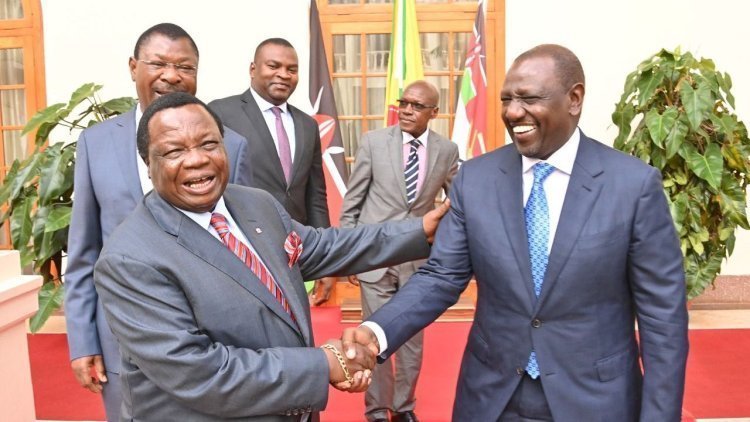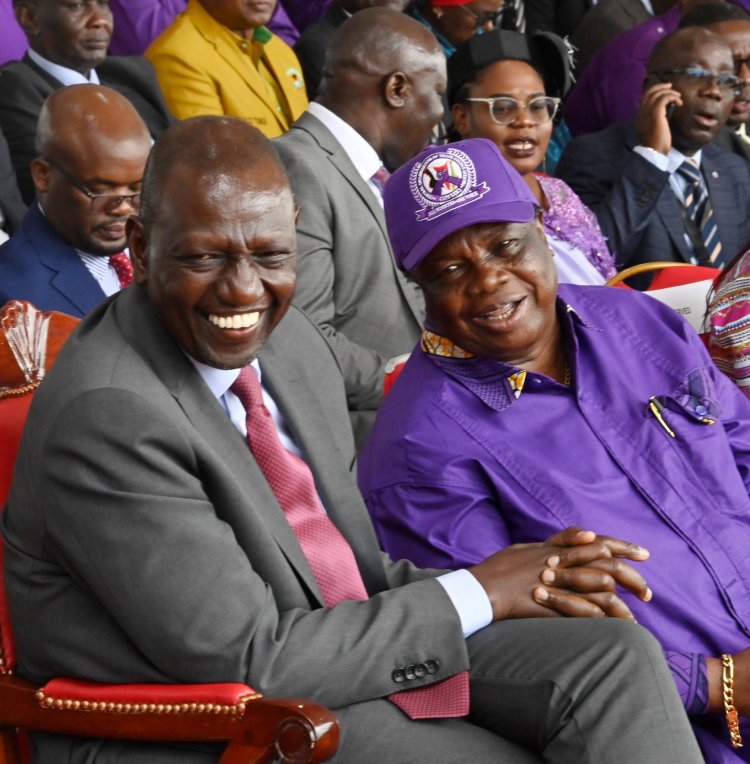Ruto Appoints Atwoli To DPP Selection Team
However, the notice did not indicate the timelines that the selection of the DPP would be issued.

Central Organization of Trade Unions (COTU) Secretary General Francis Atwoli was on Wednesday, June 21 appointed by President William Ruto to a selection panel for the nomination and appointment of the Director of Public Prosecutions (DPP).
The COTU boss was appointed alongside Ethics and Anti-Corruption Commission (EACC) Chief Executive Officer (CEO) Twalib Abdallah Mbarak.
The duo were highlighted for selection to this crucial role, according to Gazette Notice No. 8221, issued on Tuesday, June 20.

President William Ruto and COTU boss Francis Atwoli during the Labour Day Celebrations at Uhuru Gardens on May 1, 2023. /PCS
Others included:
- Mary W. Kimonye - The Principal Secretary State Department for Public Service appointed to represent the Office of The President
- Shadrack J. Mose - The Solicitor General appointed to represent the Office of the Attorney-General.
- Mary Adhiambo Maungu - Representing the Public Service Commission (PSC)
- Roseline Odede - The chairperson of the Kenya National Commission on Human Rights and will represent the organisation.
- Richard Onsongo - An advocate of the High Court of Kenya, he will represent the Law Society of Kenya
"In exercise of the powers conferred by section 8 (1) of the Office of the Director of Public Prosecutions Act, 2013, L, William Samoei Ruto, President of the Republic of Kenya and Commander-in-Chief of the Defence Forces, appoint the seven to be members of the Selection Panel for the Selection of Nominees for appointment as the Director of Public Prosecutions," read the notice in part.
However, the notice did not indicate the timelines that the selection of the DPP would be issued.
The PSC shall convene the first meeting of the selection panel, at which its members shall elect a chairperson from among them.
The selection panel shall, within seven days of convening, by advertisement in at least two daily newspapers of national circulation, invite applications from persons who qualify for nomination and appointment for the position of DPP.
The selection panel shall within fourteen days consider the applications received, shortlist the applicants and publish the names of the shortlisted applicants and qualified applicants in at least two daily newspapers of national circulation.
The selection panel will conduct interviews of the short-listed applicants and list three successful applicants in the order of merit and forward the names to the President for consideration and appointment.
The post of the DPP fell vacant after former DPP Noordin Haji took over as the Director General of the National Intelligence Service (NIS) on June 14, following successful vetting and approval by the National Assembly (NA).
Core functions of the DPP:
The DPP makes the decision to charge and determines what charges should be preferred in a criminal case. The DPP performs the following functions;
- To institute and undertake criminal proceedings against any person before any court of law other than a court martial in respect of any offences alleged to have been committed by that person;
- To take over and continue any criminal proceedings instituted or undertaken by another person or authority;
- To discontinue at any stage before judgment is delivered on any criminal proceedings;
- To direct investigation and guide the conduct of criminal investigations;
- To handle matters relating to international relations including extradition and Mutual Legal Assistance(MLA);
- To advise government Ministries, Departments, Agencies and County Governments on matters pertaining to the development and application of criminal law;
- To monitor, train, appoint and gazette public prosecutors;
- To facilitate victims of crime and witnesses during prosecution;
- To contribute and influence policy, procedure and law reform; and to address complaints raised by ODPP clients that is within the office's mandate.







